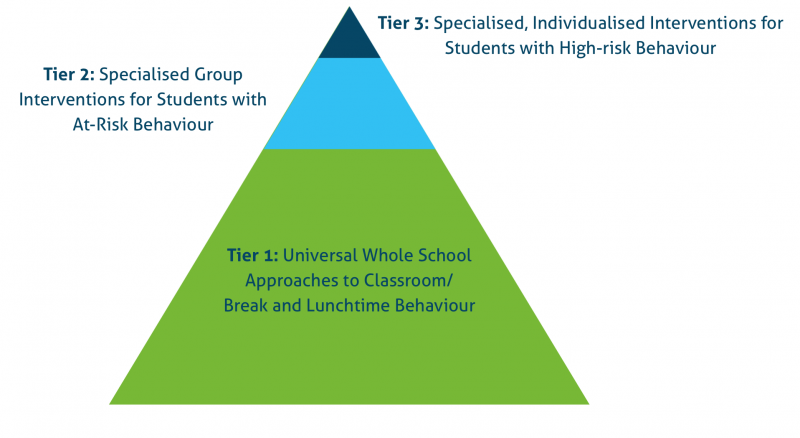How can we help?
Whole-school training
Our whole school training and support packages is a game-changers. We give schools the framework to build a consistent and effective approach to the way everyone manages behaviour and builds relationships. We really, honestly, know how to achieve consistency.
The 3-tiered Approach to Behaviour Management
 Tier 1
Tier 1
These are the routines, rituals and rules that everyone signs up to. We believe every school should have them and make them explicit. Not a big book of them; 2-sides of A4 will usually suffice. When we’ve truly embedded Tier 1 practice across school, only then can we really know who our Tier 2 and Tier 3 pupils are. And, by the way, this is the very best way to protect your already overworked inclusion/pastoral team!
Tier 2 and 3
When we have properly identified our Tier 2 and 3 pupils, then we can start to support them. With years of experience of supporting Tier 2 and Tier 3 pupils, we know all the interventions to use and how to choose which ones to use. (Hint: We always start with a Functional Behavioural Assessment.)
More than just a training day
Programme content for Tier 1, 2 and 3:
- Based on current good practice, we will help you agree on your Tier 1 behaviour expectations and your responses if they don’t get them
- We’ll help you rewrite your behaviour policy so that it’s the most useful document in school, ensuring a consistent approach from the whole school team
- The agreement of a clear and shared hierarchy of consequences and recognition
- Access to bank of video resources, searchable by strategy, so you can see how the approach actually works in the classroom
- Support for staff struggling with difficult cohorts, team-teaching, strategy modelling and video-enhanced lesson study
- Long-term strategies and support for dealing with your most challenging pupils
- Leading assemblies to introduce the new approach
- Parents’ meetings
- All associated Tier 1, 2 and 3 resources
- Guidance to optimise ways to store, access and utilise behaviour and child-protection information
- Ongoing project management and support using www.asana.com. We don’t just do the training and then leave you to it!
- Working alongside the lunchtime to team to embed Tier 1 routines and responses
- Behaviour data collection and analysis (Imagine schools were half as good at collecting and analysing behaviour data as they are for progress data.)
- Embed positive school-wide Academic Behaviours like Growth Mindset and other metacognitive approaches
- Embed positive school-wide Social Behaviours like Restorative Practice and other relationship building approaches
Starting the Project
We start our behaviour improvement project by collecting some key information about your school, including deciding who will be responsible for each area. When everyone has just a few manageable elements to oversee, we see far greater success in embedding changes in the long term.
Managing the project going forward
We use simple online task management software so that everyone can track the progress of our organisational changes.
Ongoing support
Our training support packages last between 3 and 9 months, depending on your needs. We meet with all the relevant staff on an ongoing basis rather than the front-loaded support of most providers.
How many personal trainers do training days?
None.
Personal trainers are effective because they check in with their clients regularly – just like we do. Regular, short meetings are far more effective than two intensive days at the beginning of term.
We listen
This is the first thing we do. We’ll find out what’s going well and the areas you’re looking to improve. Schools are different; your setting and catchment will be unique. We’ll tailor our approach to your circumstances to help ensure success.
We build on good practice
Great practice will already be going on at your at school. We don’t dismantle stuff that’s working; we’ll help you build on it, spread it and embed it across the whole school. In our experience, all the strategies to manage behaviour effectively will already be going on in your school. We just make sure everyone is using all the great strategies, all the time.
We deliver
“The Future Behaviour approach revolutionised behaviour in our school. Everyone who visits us comments on how calm, supportive and friendly our school is. The staff love the approach and, most importantly, our children do too!“
Richard Yates, Headteacher, West Drayton Primary School, Hillingdon
In essence
Our approach sets out to ensure the balance between support and limit-setting. In other words, we’ll help your staff nurture with structure.
The teachers we all liked at school were invariably really nice and really strict (our book tells you more about this). This is our aim for our initial Tier 1 training – to create very nice and very consistent classroom practitioners.
Training for everyone
This training is not just for teaching staff. The training is most effective when learning assistants, lunchtime supervisors, administrators, volunteer helpers and even headteachers attend our training. It’s brilliant training and brilliant value.
It might be a cliché but we should never underestimate the power of “all singing from the same hymn sheet”.
Researched
We’ve got hundreds of strategies to share, all of which are explained within our over-arching philosophy, which is easy to understand and easy to implement. All of our work is based on research (check out www.pbis.org/research for more details), but it’s firmly grounded in decades of teaching and leadership experience.
You get what you need – no more, no less
Our tiered approach ensures you get exactly the support you need, whether it’s 2 hours a week, 2 days or 20 weeks. Get in touch to discuss how we can help you deliver the behaviour you really want in your school.
Find out how other schools have benefited from the Future Behaviour approach

 Tier 1
Tier 1




